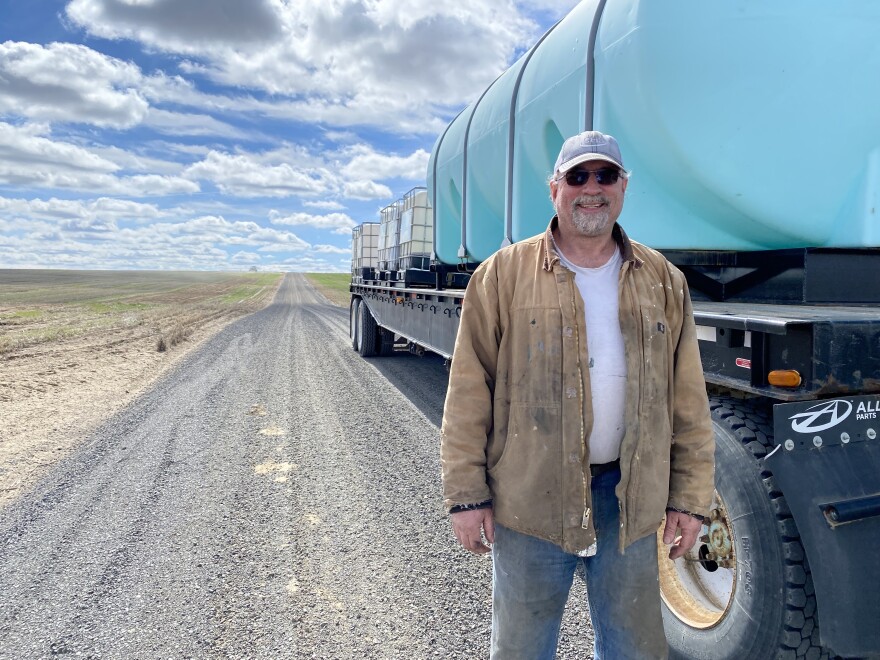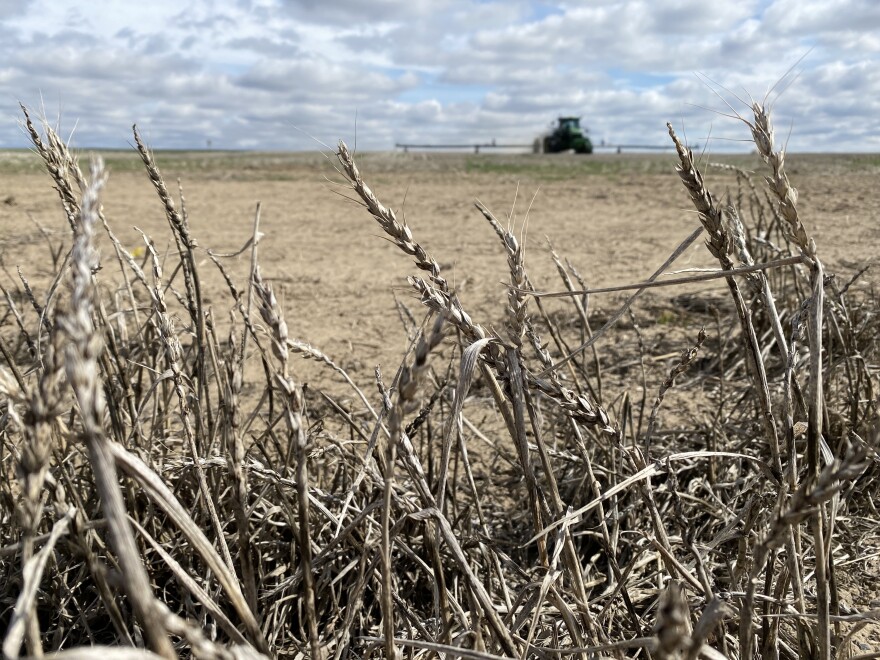Wayde Hudlow is parked on the remote corner of Lone Star and Hoover – two lonely roads dividing four yawning wheat fields. Hudlow’s tanker truck is filled with RoundUp he bought last fall. A tractor and sprayer operated by his field man work back and forth over the field.
“We’re spraying our stubble fields to kill the cheatgrass, and volunteer wheat that’s in our stubble before we make summer fallow,” Hudlow says. “We’re spraying Roundup to kill whatever is out there that’s green.”
It was lucky he bought this chemical last fall. This year, the price is way up.
Farmers are earning higher prices for their crops right now – but are also paying higher prices for just about everything.
“Last year, we were paying about $17 a gallon - $15 to $17 a gallon for RoundUp,” Hudlow says. “And now, if you can get it at all, it’s probably $60 or $70 a gallon.”

Supply chain, a war and tariffs
“It’s definitely something that weighs on us farmers at times. Because you can’t pass on those higher prices,” says Nicole Berg, president of the National Association of Wheat Growers. She also dryland-farms herself in the Horse Heaven Hills in southeast Washington.
Berg says the war and trade embargoes are creating volatility in the commodities market. Russia is the largest wheat producer on the planet. With Ukraine, it grows nearly a third of the world’s wheat.
And Northwest wheat farmers can’t raise their prices because they’re competing in a global market.
“The wheat prices are going limit up, limit down, limit up, limit down,” Berg says. “And there is just all this uncertainty across the countryside.”
This year’s crop is planted, but the war is also affecting farm chemicals like fertilizer and pesticides because many raw components come from the Black Sea area.
Now wheat farmers are worried about their fall planting.
Leslie Druffel is with McGregor Company, a major ag chemical firm based outside Colfax, Washington.
“You might have to have plan B, plan C, plan D - you know halfway through the alphabet - to try to make sure you’ve got the right crop in the ground and you’ve fed it and protected it,” she says.
Druffel says having costs go up on everything by nearly 50 percent – is crushing.
“You know, family farms have been worked for generations,” she says. “And being the one that has to finally give it up – that’s a heavy burden for anybody.”

In a press statement, Bayer – the maker of Roundup – says: “As we look at the ag supply chain as a whole, challenges have created delays in the import of raw materials, competition for packing and packaging materials, port congestions, container shortages and high demand for transportation, including truck drivers who help us get our products to our retail customers. All of these have impacted companies around the globe, including Bayer, and beyond the agriculture industry. The recent increases in glyphosate prices in the marketplace can be attributed to factors affecting supply and demand throughout the world. These factors include weather events, energy restrictions, high demand for transportation and global supply chain challenges caused by the COVID-19 pandemic.”
The wrong side
Olivia Grassl and her husband Stacy Kniveton are at the Community First Bank in Connell, Washington to sign a major farm loan. Olivia looks down at the documents on the table.
The bank’s senior agriculture officer, Bill Shibley, smiles and asks, “You ready to work on your loans for another year?”
Olivia and Stacy grow wheat, grass seed and beans. The couple’s eyes widen as they inspect the documents.
Banker Bill Shibley says, “Numbers are a lot bigger this year, aren’t they?”
Laughing a bit, Olivia says, “Yeah they are. I wasn’t expecting that one. OK, uhhh, alright, yeah.”

It’s a big risk for Olivia and her husband. They’re signing for the loan as their corporate farm and personally. Stacey Kniveton hopes their crop prices will hold until they’re sold.
“When it does go down, you just don’t want to be on the wrong side of it,” Stacy Kniveton says.
Add the continuing Western drought to the war in Ukraine - and farmers could be signing on for a tough couple of years.


